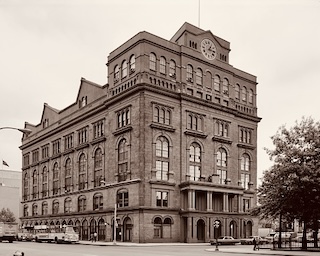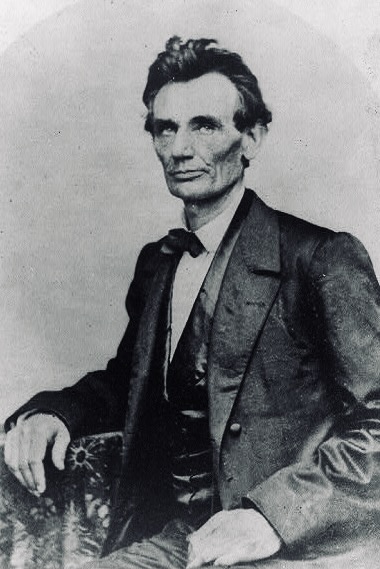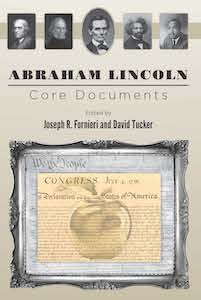
On February 27, 1860, Abraham Lincoln gave one of the most important and effective speeches of his political career. His speech at Cooper Union was a rhetorical masterpiece and helped make him the Republican candidate for president.
Lincoln’s debates with Stephen A. Douglas in 1858 allowed him to reach a national audience. In those debates, Lincoln argued that Douglas’s doctrine of popular sovereignty—that the people of the territories could decide for themselves whether they wanted slavery—meant an indifference to the spread of slavery. Worse, it was a betrayal of America’s principles. Rather than trumpeting the cause of self-government, Douglas’s doctrine of popular sovereignty was its death knell. If whites could decide to enslave blacks, then Lincoln argued, there was nothing to prevent some whites from deciding to enslave other whites. Only adherence to the self-evident truth that all human beings were equal could save popular sovereignty—self-government—for all.

Douglas continued to press his case, however. In September, 1859, he published an essay in Harper’s New Monthly Magazine, “The Dividing Line between Federal and Local Authority,” arguing for his version of popular sovereignty and claiming that this was in line with the thinking of the founding generation. He delivered speeches on the same subject, all in an attempt to secure the presidential nomination of the Democratic party. In October, John Brown carried out his raid on Harper’s Ferry, further inflaming the sectional issue that threatened civil war.

In this fateful situation, Republicans in New York City invited Lincoln to give a speech scheduled for February 1860. Lincoln had his own presidential ambitions, but to become the Republican candidate, he needed to win the support of eastern Republicans, who tended to favor Senator William Seward of New York. Lincoln had to show that he, and not the more experienced and better-known Seward, was the man to defeat Douglas.
Lincoln prepared for his speech by doing extensive research in the Illinois State Library. He read primary documents—principally the words of the thirty-nine people who signed the Constitution—and historical records—how those thirty-nine voted on issues of federal control of the territories. He did so to fight Douglas on the ground that Douglas claimed as his own. Douglas claimed that the founding generation understood the question of who controlled the territories, whether the federal government or those who lived in the territories, better than anyone else. Lincoln showed that on Douglas’s own terms, Douglas was wrong. The documents and records showed that a substantial majority affirmed federal control of the territories. Showing this to be true, Lincoln showed that popular sovereignty as Douglas presented it was false.
Lincoln concluded this part of his speech by arguing that on the issue of slavery Americans ought to return to the position of the founding generation. “Let [slavery] be again marked as an evil not to be extended, but to be tolerated and protected only because of and so far as its actual presence among us makes that toleration and protection a necessity.” This was not because Americans had to accept the views of the founding generation. They were free to reject those views, but only, Lincoln argued, “upon evidence so conclusive and argument so clear” that it outweighed their authority. But evidence and argument showed the founders right on the issue of slavery and supported their authority.

In the next section of his speech, Lincoln addressed southerners. He considered and countered one by one their objections to the Republican Party, repeatedly appealing to the standard Douglas had raised “of our fathers, who framed the government under which we live.” In this section, he also offered a concise statement of how to evaluate the Dred Scott decision (1857). Notoriously, this decision held that African Americans, free or slave, whose ancestors were brought to the United States and sold as slaves could not be American citizens, and that the Missouri Compromise (1820) was unconstitutional because the federal government did not have the power to exclude slavery from any federal territory. In discussing the decision, one thing Lincoln showed was that the Court based its ruling on a misstatement of fact. The Court’s decision stated that “the right of property in a slave is distinctly and expressly affirmed in the Constitution.” Lincoln pointed out that such a right was not “distinctly and expressly affirmed” in the Constitution. On the contrary, Lincoln said,
Wherever in that instrument the slave is alluded to, he is called a ‘person’; and wherever his master’s legal right in relation to him is alluded to, it is spoken of as ‘service or labor which may be due,’ as a debt payable in service or labor. Also, it would be open to show, by contemporaneous history, that this mode of alluding to slaves and slavery, instead of speaking of them, was employed on purpose to exclude from the Constitution the idea that there could be property in man. (Lincoln was alluding to a remark Madison made at the Constitutional Convention.)
Overall, Lincoln’s consideration of the southern view showed, as he said, that southerners would abandon the Constitution, if they could not get their way. This was as willful and arbitrary an assertion of power as slavery itself.
Finally, Lincoln addressed his fellow Republicans. He stressed to them that the fundamental issue was whether slavery was right or wrong. Republicans held it was wrong. They should act on this understanding. They must stand by their duty “fearlessly and effectively.” Lincoln closed with a stirring imperative: “Let us have faith that right makes might, and in that faith, let us, to the end, dare to do our duty as we understand it.”

Scholars often note that Lincoln’s Address at Cooper Union lacked the flourishes and embellishments of mid-nineteenth century speeches. It reads, most say, as if it were a lawyer’s brief. This is true, but this is also what gave the speech its rhetorical force and its political effect. The country was at the brink of war, passions at fever pitch. Lincoln stood for a calm, factual, reasoned consideration of the case. Southerners, for example, claimed Republicans were revolutionaries, and tried to associate them with fanatical abolitionists. Lincoln’s tone and words undid this criticism, as his presentation of the case revealed southerners to be unreasonable hysterics. Using this rhetorical approach, Lincoln took the advice he offered in a great speech from early in his career, the Lyceum Address (1838). In perpetuating the Republic, Lincoln had then argued, “passion has helped us; but can do so no more. It will in future be our enemy. Reason, cold, calculating, unimpassioned reason, must furnish all the materials for our future support and defense.”
As Lincoln stood on the speaker’s platform at Cooper Union, unimpassioned reason stood in opposition to fiery willfulness, a cool presentation of the facts to willful misrepresentation. Amid the political storm, Lincoln presented himself and Republicans as a calm rallying point. Their position was consistent with historical fact, political necessity, and moral principle. His audience understood this, and enough Americans came to understand it to bring Lincoln to the White House.
When we read Lincoln’s Cooper Union speech we are in effect a jury hearing the words of the greatest advocate of the Constitution’s and America’s founding principles as thoroughly anti-slavery. It is remarkable that still today those who claim to be most passionate in their defense of freedom repeat the mistaken facts and arguments of those who then advocated slavery. As we steer a way through our own political storms, we should remember the importance of fact and reason, and above all renew our faith that right makes might.
For more on Abraham Lincoln’s writings, see our CDC volume, Abraham Lincoln, available for free download or hard copy purchase.






